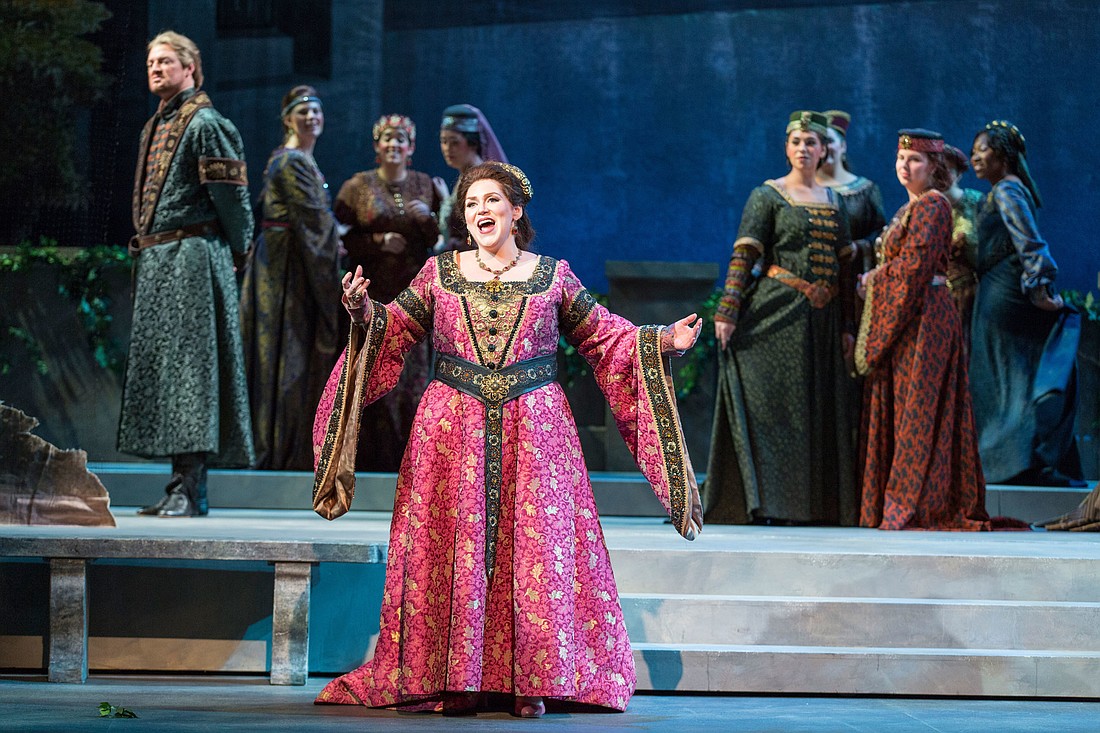- April 1, 2025
-
-
Loading

Loading

The Battle of Legnano is to Italy what the Battle of Bunker Hill and D-Day are to the United States: an important source of inspiration for victory. Although the original battle took place in 1176 between the Holy Roman Empire, led by Emperor Frederick Barbarossa and the Lombard League, the enormous win for the Lombards at Legnano (outside of Milan), was a turning point in the history of Italy, and the Battle was so important to the nation’s unification in 1848, Garibaldi not only referred to the ancient battle, it also became part of the Italian National Anthem.
Something else happened in 1848. Giuseppe Verdi was writing his 14th opera, “La battaglia di Legnano,” and although many of the characters in his opera are fictional, the important reference to the battle, seven centuries earlier, became the impetus for this opera to be a paean to Italian history and unification.
Sarasota Opera was wise to hold this relatively early Verdi opus until this season in its enormous excursion through the Verdi archives, since the work calls for a colossal chorus, and this year, being the one they saved to present “Aida,” with its massive ensemble, made a perfect pairing.
The Sarasota Opera Chorus fills the house with a throbbing, vibrant sound that’s hard to match anywhere else. Artistic Director Victor DeRenzi and Chorus Master Roger L. Bingaman pull titanic waves from their singers, and the result is thrilling.
Although this is not one of Verdi’s greatest works, it deserves more productions than it gets, because there are some magnificent vehicles for the singers. It’s also prescient, because you hear the Verdi that’s to come.
While opera is about the music and singing, it’s also about the passion and drama, and “La battaglia di Legnano” has plenty. The unifying thread of the work is love of country. Long Live Italy (which wasn’t even in existence when the original battle took place) is the thought upper-most in every character’s mind throughout the opera. Next to God, Country. And next to country, honor, vows and love.
What we don’t see that often in early Verdi operas are evolving characters; people who have strong beliefs that are monolithic to start, but are actually capable of forgiveness and understanding. Those emotions are written into the score, and they were also carried out with care and clarity by the stage director of Sarasota Opera’s new production, Martha Collins. Every person on stage changes from an uncompromising force to one with compassion and understanding. In other words, they’re flesh-and-blood humans we can relate to.
In the pit, DeRenzi held his orchestra and both on and offstage musicians into a tight ensemble, spinning sounds that were electrifying and musical. Of course, the electricity was already in the air, because this was a special night — a night of climax to the company’s Verdi Cycle, and that, in itself, was exhilarating.
Ken Yunker’s lighting was suitably smoky and atmospheric, particularly in the interior scenes as they set off Jeffrey Dean’s scenic designs, with a nod to some of the early tapestries and paintings at the Ringling Museum.
Todd Thomas, as Rolando, the leader of the Milanese troops, almost stole the show. His rich, stirring voice combined, with fine acting, made him a leader and lover to be trusted, admired and followed. I say “almost,” only because the rest of the leading characters were just about as strong, vocally and dramatically.
Jennifer Black, as Lida, his wife, who loves him and the son he’s given her, but who also loves Arrigo, her former lover whom she thought dead, is a brilliant soprano with a cutting but beautiful voice and the air of a leader’s wife.
Martin Nusspaumer’s Arrigo, the warrior everyone thought had died in battle but who is very much alive and furious that Lida’s married another (even though that other man is his best friend and partner in battle), is a strong, vibrant tenor with a demeanor to match.
Young Bok Kim made an important and impressive (as always) appearance as Barbarossa (complete with red beard) and Harold Wilson was the Iago-like villain, Marcovaldo, who blows Lida’s cover and gives her secret love for Arrigo away in a couple of brief but pivotal scenes. Smaller roles were taken by studio artists with one, Tara Curtis, in the role of Imelda, Lida’s handmaid, standing out for excellent vocalism and acting.
There were moments of pitch discrepancies scattered throughout the opera by almost everyone on stage, except the remarkable chorus. But we’ll mark those up to opening-night jitters. And although it’s difficult to overcome the somewhat bulky plot with action that takes place primarily off stage, between the scenes, it’s worth it for the high quality singing and sound coming from stage and pit.